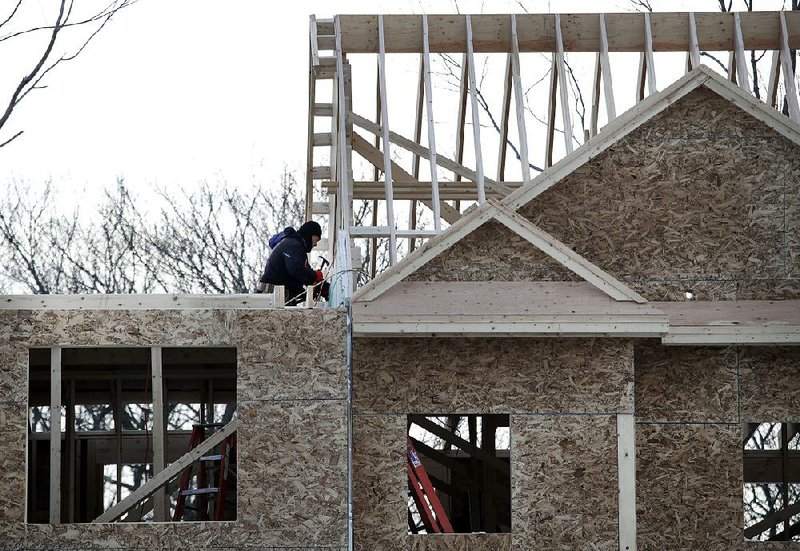WASHINGTON -- U.S. long-term mortgage rates fell slightly this week, marking a third-straight week of declines as a continued inducement to purchasers in the spring homebuying season. And U.S. home construction rose in April, led by an uptick in single-family homes.
Mortgage buyer Freddie Mac said Thursday that the average rate on the 30-year, fixed-rate mortgage eased to 4.07% from 4.10% last week. By contrast, a year ago the benchmark rate stood at 4.61%.
The average rate for 15-year, fixed-rate home loans declined this week to 3.53% from 3.57% last week.
The continuing U.S.-China trade war kicked into a fevered battle this week after high-level talks between the two sides broke down May 10, and President Donald Trump's administration imposed new tariffs on $200 billion in Chinese imports. Beijing retaliated Monday with increased tariffs on $60 billion of U.S. products. That sent stock prices tumbling around the globe.
The Dow Jones industrial average plunged more than 600 points as nervous investors shifted money from volatile stocks to the bond market.
Bond yields fall as prices rise. The yield on the 10-year Treasury note, which influences mortgage rates, was 2.37% late Wednesday, down sharply from 2.48% a week earlier. It rose to 2.41% Thursday morning.
With mortgage rates at historically low levels and positive economic signs, Freddie Mac is expecting home sales to increase this summer. "While signals from the financial markets are flashing caution signs, the real economy remains on solid ground with steady job growth and five-decade low unemployment rates," Freddie Mac chief economist Sam Khater said.
Freddie Mac surveys lenders across the country between Monday and Wednesday each week to compile its mortgage rate figures.
The average doesn't include extra fees, known as points, which most borrowers must pay to get the lowest rates.
The average fee on 30-year, fixed-rate mortgages was unchanged this week at 0.5 point.
The average fee for the 15-year mortgage held at 0.4 point.
The average rate for five-year adjustable-rate mortgages rose to 3.66% from 3.63% last week. The fee remained at 0.4 point.
The Commerce Department said Thursday that home-building rose 5.7% last month to a seasonally adjusted annual rate of 1.24 million. But housing starts fell 2.5% from a year earlier, suggesting that would-be homebuyers are facing a shortage of new houses.
Construction of single-family homes increased 6.2% to 854,000 but was down 4.3% from a year earlier. Construction of apartments and condominiums rose 2.3% to 359,000 and was up 1.4% from April 2018.
From March to April, housing starts surged 84.6% in the Northeast and 42% in the Midwest. Analysts at Contingent Macro Advisors noted that both regions "saw a rebound following harsh winter weather." But construction fell 5.7% in the South and 5.5% in the West. The regional construction numbers can jump around from month to month.
Housing permits, an indicator of future activity, rose 0.6% to 1.3 million, the first rise since December. Permits were down 5% from April 2018. Single-family home permits skidded 4.2% in April from March and were down 9.4% from a year earlier.
About 194,000 homes were authorized but not started, about in line with recent readings and indicating a steady supply.
Reports due next week are forecast to show existing-home sales, which make up about 90% of the market, picked up in April while new-home sales were seen easing from a one-year high.
A separate report Thursday from the Labor Department showed initial jobless claims fell more than forecast last week to a four-week low of 212,000, offering the latest evidence the jobs market remains tight. The four-week average edged up.
Information for this article was contributed by Paul Wiseman of The Associated Press and by Reade Pickert of Bloomberg News.
Business on 05/17/2019
